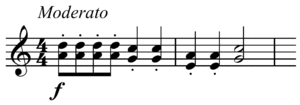Oriental riff
The Oriental riff, also known as the East Asian riff and the Chinaman lick, is a musical riff or phrase that has often been used in Western culture as a trope to represent the idea of East or Southeast Asia. The riff is sometimes accompanied by the sound of a gong at the end.

History
The Oriental riff is a Western creation. The first known example of a precursor, showing similar rhythm if not yet melody,[2] is the "Aladdin Quick Step", composed around 1847 and used in an Aladdin stage show named The Grand Chinese Spectacle of Aladdin or The Wonderful Lamp.[3][4][5] Later related tunes included "Mama's China Twins (Oriental Lullaby)" from 1900. In the 1930s, a couple of cartoons used a version of the tune specifically to accompany animated stereotypes of East Asians.[3]
The notes used in the riff are part of a pentatonic scale and often harmonized with parallel open fourths, which makes the riff sound like East Asian music to the casual Western listener.
Uses
The Oriental riff and interpretations of it have been included as part of numerous musical works in Western music. Examples of its use include Poetic Moods (Poeticke nalady) (1889) by Antonin Dvořák,[6] "Limehouse Blues" by Carl Ambrose and his Orchestra (1935), "Kung Fu Fighting" by Carl Douglas (1974), "Japanese Boy" by Aneka (1981),[1][4] The Vapors' "Turning Japanese" (1980),[4] "Chinese Laundry Blues" by George Formby (1932), Rush's "A Passage to Bangkok" (1976),[4] and as part of the whistling refrain in "Young Folks" by Peter Bjorn and John (2006).[4]
The Oriental riff has also come to be used in many Japanese compositions as well, particularly in video games; these include Yie Ar Kung-Fu's main theme, the Chai Kingdom theme in Super Mario Land, Dragon Chan and Hoy Quarlow’s theme in Super Punch-Out!!, Min Min's theme in ARMS, the Team China stage in Super Dodge Ball, the song "Shao Pai Long" in The Super Dimension Fortress Macross, the fighting theme of the Kung-Fu chapter in Live A Live, the Wabi Sabi Wall theme in Ape Escape, and the track "Oriental Rush" in Yakuza: Like a Dragon. Unlike the Western use of it seen in cases such as "Turning Japanese", works produced in Japan often use it to give an impression of China.
See also
- Arabian riff
- Tarantella Napoletana, representing Italy
- Stereotypes of East Asians
- Wonton font
References
- "Dadadada-da-da-dun-dun-daa!: The Asian Riff". Adoption.com: China Adoption blog. February 19, 2007. Archived from the original on July 13, 2012. Notates riff a perfect fourth higher.
- S. S. Steele and T. Comer [songwriters] (1847). "Aladdin Quick Step". Favorite Melodies from the Grand Chinese Spectacle of Aladdin or The Wonderful Lamp. Boston: Prentiss and Clark. Retrieved December 22, 2021.
- Steve Inskeep [host] (August 28, 2014). "How The 'Kung Fu Fighting' Melody Came To Represent Asia [transcript]". NPR. Retrieved December 22, 2021.
- "Interrogasian: Hyphen's sensei of sensibility answers your questions about Asian culture". Hyphen. 13 April 2010. Retrieved 2011-04-18.
- Lisa Martland (7 June 2010). "Radio: Light Programme". The Stage. Retrieved 2011-04-18.
- Archived at Ghostarchive and the Wayback Machine: Antonín Dvořák Poetic Moods Op.85, Radoslav Kvapil. YouTube.
